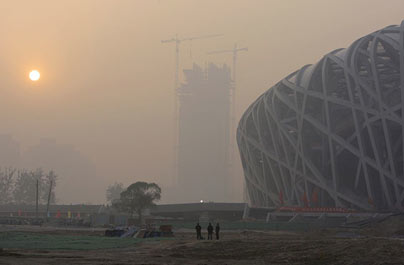Posts Tagged ‘Air Quality’
Morning News Names Jeff Mosier as its New Environmental Reporter
 Notice came on Friday that the Dallas Morning News had finally decided to fill the environmental beat reporter position left vacant by Randy Lee Loftis' departure. The lucky winner was announced via a response to a reader's comment on a story about the Lake Lewisville BLM fracking lease sale.
Notice came on Friday that the Dallas Morning News had finally decided to fill the environmental beat reporter position left vacant by Randy Lee Loftis' departure. The lucky winner was announced via a response to a reader's comment on a story about the Lake Lewisville BLM fracking lease sale.
"This is just one more reason the Morning News needs an environmental beat reporter," wrote the reader.
"That would be me," replied reporter Jeff Mosier, whose debut under his new job title was that day's story on the BLM fracking lease.
Shortly after, Mosier sent out this "job status" tweet with picture of the Lake Lewisville story, "My debut as environmental writer for @dallasnews. I'll spend more time at landfills than Super Bowls now"
That's a reference to Mosier's stint as a DMN SportsDay reporter covering the Cowboys on and off since at least 2004. Texas environmental politics is definitely a contact sport, but that's not the reason he was picked. He's a News journeyman who came to the paper with a lot of other former Times Herald employees in 1994 and rose through the ranks on a number of different beats. Here's a sampling of his coverage of Dallas City Hall goings-on. So local politics is not a foreign subject matter.
More on point, he was writing for the News' Tarrant County/Fort Worth Bureau in the early stages of the citizen backlash to urban drilling in the Barnett Shale. He's familiar with the issues surrounding fracking and wrote about them from roughly 2009 to 2013. Some examples:
Air tests at natural gas drilling sites fuel concerns in Barnett Shale
State will report today on Barnett Shale air pollutants
Texas House bill seeks to scale back city gas drilling restrictions
Arlington suing Chesapeake Exploration over claims of unpaid natural gas royalties
Cowboys Stadium site isn't expected to be used for gas drilling
From all previous indications, it looked like the News was grooming long-time Educational Reporter Jeffery Weiss to take Loftis' place. Weiss covered the unveiling of Downwinders' UNT Ozone Study and Dr. Robert Haley's Public Health Cost Study back in October, as well as the subsequent Dallas County Commissioners' resolution on reducing pollution from obsolete East Texas coal plants. But apparently Weiss is being put in charge of Energy coverage for the paper.
These moves are all part of a large shake-up of the entire Morning News newsroom as the paper tries to make the on-going rocky transition from print to digital. Lofttis' retirement could have been seen as a chance to do some necessary belt-tightening at the expense of a hunk of coverage. To the paper's credit, it resisted that temptation and named a new environmental beat reporter.
While Mosier's not a complete neophyte, he faces a steep learning curve. Give him some slack as he begins to reacquaint himself with The Way Things Really Work, and let's see if he can provide the public with needed clear-eyed reports from the front.
Even a Few Weeks of Cleaner Air Can Make A Big Difference
 We can't tell you how many times a resident from DFW will go on a business trip or vacation to a less-polluted place and report an almost instant shedding of the ill effects of dirty air, only to have an almost equally fast re-acquaintance with those effects once they return. Could air pollution really make that much of a difference in so little a period of time?
We can't tell you how many times a resident from DFW will go on a business trip or vacation to a less-polluted place and report an almost instant shedding of the ill effects of dirty air, only to have an almost equally fast re-acquaintance with those effects once they return. Could air pollution really make that much of a difference in so little a period of time?
As it turns out, yes.
Via an new study recently published in the Journal of the American Medical Association, researchers found that the Chinese government's decision to close down Beijing's polluting factories and take cars off the road during the 2008 Olympics resulted in a remarkable short-term improvement in cardiovascular health. It's the first major study to look at the immediate effects of air pollution in young healthy adults.
In a synopsis published by Environmental Health News, one of the authors describes the study and its importance:
"For the 5-month study from June to November, the researchers recruited 125 resident doctors with an average age of 24 from a centrally located hospital. Half were male, and all were healthy with no history of diabetes or cardiovascular disease.
The researchers measured heart rate, blood pressure and six markers of cardiovascular diseases in blood samples before, during and after the games. The markers included C-reactive protein (CRP), fibrinogen, von Willebrand factor, soluble CD40 ligand, soluble P-selectin concentrations and white blood cell count (WBC).
Two markers associated with blood clotting significantly decreased from pre-Olympic to the during-Olympic period: P-selectin levels dropped by 34 percent and von Willebrand factor levels were reduced by 13 percent. After the games, when the pollution control measures were removed, most markers rose back to pregame levels. But two markers – P-selectin and systolic blood pressure – worsened and showed a significant increase compared to the levels during the games.
Air pollution emissions were also measured at similar times. Levels of most air pollutants during the games decreased up to 60 percent compared to their pregame levels, depending on the type of pollutants. For example PM2.5 dropped 27 percent, nitrogen dioxide 43 percent and sulphur dioxide 60 percent. After the games when pollution controls were removed, emissions rose to higher levels than were measured before the games started.
This study suggests that even young healthy people can benefit from short-term air pollution reduction and supports efforts to quantify and understand the benefits and costs of air pollution control measures."
The next time a politician complains about the cost of air pollution controls, make sure and ask them if they're for preventative heart disease treatment. When they say yes, please remind them that keeping crap out of our air that would otherwise end up in our lungs is such preventative care.
